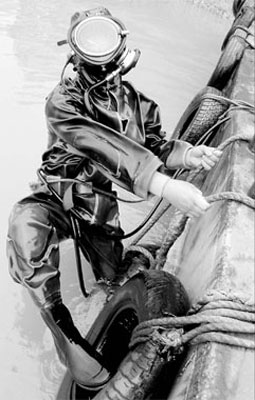Guo Wenbiao has saved more than 100 lives at sea. And still to this day, after more than 20 year of service, the 41-year-old also known as "Water Ghost" operates his rescue service free of charge.
In the fishing area of Wenling, Zhejiang, Guo is the man who is called whenever there is someone who needs to be plucked from the ocean.
In August 2005, Typhoon Matsa hit the Shitang fishing area of Wenling. Two fishing boats were stuck at sea and the waves were so big that police were unable to rescue the crews.
In desperation, a call was made to Guo, who soon arrived in his motorboat, and disappeared in the roaring sea. After one-hour search, he found the fishermen lying on a reef. Risking his own life, Guo brought them back to the shore.
"It felt good that I was able to help those people," says Guo.
The "Water Ghost" returns to his boat. (photo: China Daily)
Over the next two years, he managed to save another 20 people from the sea.
"Water Ghost" was originally a derogatory term, but here it is a respectful title bestowed upon Guo, comparing him to a sea deity.
"People call me 'Water Ghost' because of my good swimming skills. I have played in the sea since I was 5. Now I can stay in the sea for two days, and remain underwater for 5 minutes," he says.
One of Guo's most memorable missions occurred shortly after Typhoon Rananim in 2004.
On the second day after the typhoon had ceased, a young man's parents came to Guo, telling him that their son had fallen into the sea and probably had no hope of returning. Without hesitation, Guo put on his diving suit and jumped into the sea searching for his body.
"Many families have lost loved ones in typhoons. I want to reduce their pain and bring some happiness to these families," he says.
Guo's rescues have not been confined to the water. On the night of February 19, 2006, he was heading to Shitang to help repair a few boats. On the way, he saw several people trying to flag down passing cars, but no one stopped.
Guo asked his driver to stop the car and saw a young man who was unconscious after being hit by a motorcycle. Guo and his driver carried the young man into the car and sped to the First People's Hospital of Wenling.
Within 12 minutes, the young man was in the emergency room and 30 minutes later, he regained consciousness. When his relatives arrived at the hospital, Guo left quietly with his driver.
Last year, three policemen, considered by their peers to be strong swimmers, studied sea survival techniques with Guo.
As part of their training, Guo takes his students to various coastal areas around Shitang, and teaches them about the regularities of the tide, the orientations of currents and the distribution of reefs.
He also simulates drowning exercises to improve their rescuing techniques. Guo even used his own money to buy two diving suits for the policemen to train in.
On the night of July 2, 2004, just before the Typhoon Mindulle struck, a freighter broke down after its propeller became tangled in nylon ropes. High winds meant that the freighter was in danger of capsizing.
Soon after, another freighter which was passing by rammed into the stranded vessel. That's when the "Water Ghost" was called in.
Guo, who was already in bed, responded immediately. After he helped save the freighter, the captain was so excited that he offered Guo money, which the rescuer refused.
In over 20 years, Guo has never accepted payment for his services, and only ever asks for enough to cover fuel costs. Guo refuses the money, even though he has a child in school, parents to support, and two crew workers to pay.
Guo originally had three boats. The fuel and salary for the crew costs over 100,000 yuan ($13,831) every year. Recently, he borrowed some money and bought a 24-m-long boat.
"This boat is quite big. It's mainly for rescuing. Maybe on the side it can be used to entertain tourists, and make some money to subsidize my family," Guo says.
A member of the 11th People's Congress of East China's Zhejiang province, Guo recently proposed three motions, including one on the "Incorporation of Fire Prevention into the Provincial Compulsory Education Plan".
On January 14, Guo went to the Development Area Branch of the Fire Brigade of Taizhou, Zhejiang province, to seek advice for his motions.
"Through investigation, we found that the biggest victims of fire are children," Guo says. "It's very urgent that we carry out basic training on fire prevention among primary and middle school students."
According to Guo, 40 percent of primary and middle school students have played with fire, but 51 percent don't have a basic knowledge of fire prevention.
Right: Guo shows his assistants how to put out a fire. Left: Guo helps two new students with their diving suits.
(China Daily February 16, 2008)



